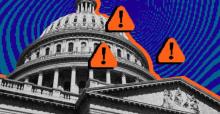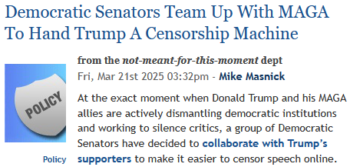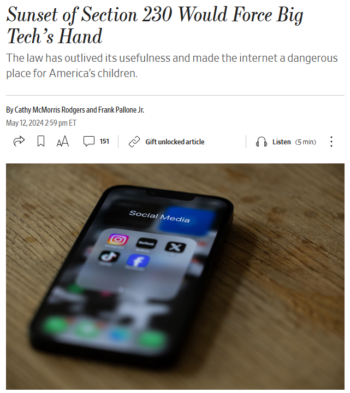
In a move that threatens to constrain online communication, congressional Democrats are partnering with their Republican counterparts to repeal a niche but crucial internet law.
According to tech trade publication the Information (3/21/25), Democratic Sen. Dick Durbin (Ill.) has allied with Republican Sen. Lindsey Graham (S.C.) to reintroduce a bill that would repeal Section 230, a provision of the 1996 Communications Decency Act. Section 230 dictates that when unlawful speech occurs online, the only party responsible is the speaker, not the hosting website or app or any party that shared the content in question.
Section 230 grants platforms the ability to moderate without shouldering legal liability, a power that has historically had the effect of encouraging judicious content management (Techdirt, 6/23/20). Additionally, it indemnifies ordinary internet users against most civil suits for actions like forwarding email, sharing photos or videos, or hosting online reviews.
Dissolving the provision would reassign legal responsibility to websites and third parties, empowering a Trump-helmed federal government to force online platforms to stifle, or promote, certain speech. While the ostensible purpose of the repeal, according to Durbin, is to “protect kids online,” it’s far more likely to give the Trump White House carte blanche to advance its ultra-reactionary political agenda.
More power for MAGA

Mike Masnick (Techdirt, 3/21/25): “These senators don’t understand what Section 230 actually does—or how its repeal would make their stated goals harder to achieve.”
The effort to repeal Section 230 isn’t the first of its kind. Lawmakers, namely Republicans Sen. Josh Hawley (Mo.), Lindsey Graham (S.C.) and former Florida senator and current Secretary of State Marco Rubio, have been making attempts to restrict or remove 230 for years, sometimes with explicitly censorial aims. But with a White House so hostile to dissent as to target and abduct anti-genocide activists (FAIR.org, 3/28/25; Zeteo, 3/29/25), abusing immigration law and violating constitutional rights in the process, the timing of the latest bill—complete with Democratic backing—is particularly alarming.
To imagine what could become of a Section 230 repeal under the Trump administration, consider an example from July 2021, when the Covid-19 pandemic remained severe enough to be classified as a public-health emergency. Democratic Sen. Amy Klobuchar (Minn.)—now a co-sponsor of Durbin and Graham’s 2025 bill—introduced an amendment to 230 that would authorize the Health & Human Services Secretary to designate certain online content as “health misinformation.” The label would require websites to remove the content in question.
News sources heralded the bill as a way to stem the “proliferation of falsehoods about vaccines, fake cures and other harmful health-related claims on their sites” (NPR, 7/22/21) and to “fight bogus medical claims online” (Politico, 7/22/21). While potentially true at the time, Klobuchar’s bill would now, by most indications, have the opposite effect. As Mike Masnick of Techdirt (3/21/25) explained:
Today’s Health & Human Services secretary is Robert F. Kennedy Jr., a man who believes the solution to measles is to have more children die of measles. Under Klobuchar’s proposal, he would literally have the power to declare pro-vaccine information as “misinformation” and force it off the internet.
‘Save the Children’

ACLU (6/27/22): The Fight Online Sex Trafficking Act (FOSTA) “hasn’t meaningfully addressed sex trafficking. Instead, it has chilled speech, shut down online spaces, and made sex work more dangerous.”
Since Klobuchar’s bill, Congress has drafted multiple pieces of bipartisan child “safety” legislation resembling Durbin and Graham’s bill, offering another glimpse into the perils of a Trump-era repeal.
Consider 2023’s Kids Online Safety Act (KOSA), which the New York Times (2/17/22) welcomed as “sweeping legislation” that would “require online platforms to refrain from promoting harmful behavior.” KOSA enjoys robust bipartisan support, with three dozen Republican co-sponsors and nearly as many Democrats, as well as an endorsement from Joe Biden.
Though KOSA doesn’t expressly call for the removal of 230, it would effectively create a carve-out that could easily be weaponized. MAGA-boosting Sen. Marsha Blackburn (R.-Tenn.), a lead sponsor, insinuated in 2023 that KOSA could be used to “protect” children “from the transgender [sic] in this culture and that influence” on platforms like Snapchat and Instagram (Techdirt, 9/6/23). In other words, lawmakers could invoke KOSA to throttle or eliminate content related to trans advocacy, should they deem it “harmful” to children.
KOSA has drawn criticism from more than 90 organizations, including the ACLU and numerous LGBTQ groups, who fear that the bill masquerades as a child-safeguarding initiative while facilitating far-right censorship (CounterSpin, 6/9/23). This comes as little surprise, considering the decades-long history of “Save the Children” rhetoric as an anti-LGBTQ bludgeon, as well as the fact that these campaigns have been shown to harm children rather than protect them.
Some outlets have rightfully included the bill’s opponents in their reportage (AP, 7/31/24), even if only to characterize it as “divisive” and “controversial” (NBC News, 7/31/24). Others, however, have expressed more confidence in the legislation. The New York Times (2/1/24), for instance, described KOSA as a means to “safeguard the internet’s youngest users.” Neither Blackburn’s publicly-broadcast intentions nor the protests against the bill seemed to capture the paper’s attention.
Instead, the Times went on to cite the Stop Enabling Sex Traffickers Act (SESTA), a 2018 law that amended Section 230, in part to allow victims of sex trafficking to sue websites and online platforms, as a regulatory success. What the Times didn’t note is that, according to the ACLU, the Fight Online Sex Trafficking Act (FOSTA), which is included in SESTA, “hasn’t meaningfully addressed sex trafficking,” and could be interpreted by courts as justification to “censor more online speech—especially materials about sex, youth health, LGBTQ identity and other important concerns.”
False anti-corporate appeals

A bipartisan pair of lawmakers argue in the Wall Street Journal (5/12/24) that repealing Section 230 would mean tech companies couldn’t “manipulate and profit from Americans’ free-speech protections”—which is true only in the sense that platforms would be forced to assume that their users do not have free-speech protections.
Protecting kids isn’t the only promise made by 230 repeal proponents. In a statement made earlier this year, Durbin vowed to “make the tech industry legally accountable for the damage they cause.” It’s a popular refrain for government officials. The Senate Judiciary Democrats pledged to “remove Big Tech’s legal immunity,” and Trump himself has called 230 a “liability shielding gift from the US to ‘Big Tech’”—a point echoed by one of his many acolytes, Josh Hawley.
And in a Wall Street Journal op-ed (5/12/24) headlined “Sunset of Section 230 Would Force Big Tech’s Hand,” former Washington Rep. Cathy McMorris Rodgers, a Republican, and New Jersey Rep. Frank Pallone, Jr., a Democrat, argued:
We must act because Big Tech is profiting from children, developing algorithms that push harmful content on to our kids’ feeds and refusing to strengthen their platforms’ protections against predators, drug dealers, sex traffickers, extortioners and cyberbullies.
These soft anti-corporate appeals might resonate with an audience who believes Big Tech wields too much power and influence. But there’s no guarantee that dismantling Section 230 would rein in Big Tech.
In fact, Section 230 actually confers an advantage upon the largest tech companies—which at least one of them has recognized. In 2021, Meta’s Mark Zuckerberg proposed reforms to 230 that would increase and intensify legal requirements for content moderation (NBC News, 3/24/21). The apparent logic: monopolistic giants like Facebook and Google can more easily fund expensive content-moderation systems and legal battles than can smaller platforms, lending the major players far more long-term viability.
But regardless of Meta’s machinations, the fundamental problem would remain: Democrats have embraced the MAGA vision for online governance, creating the conditions not for a safer internet, but a more dangerous one.
